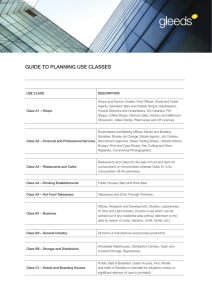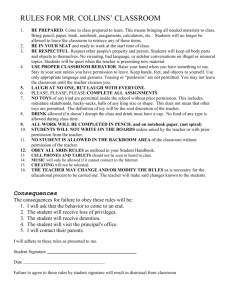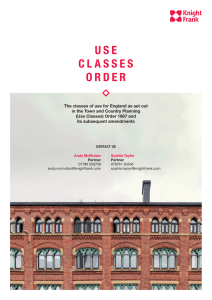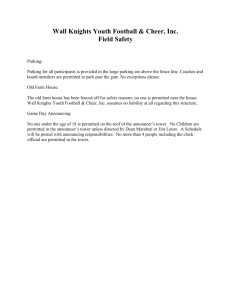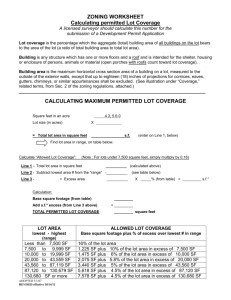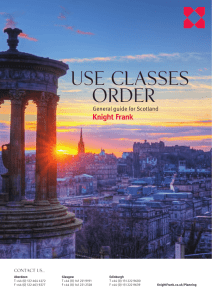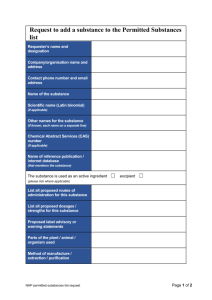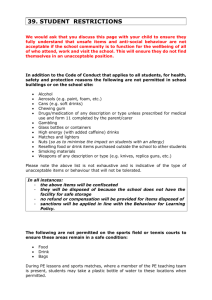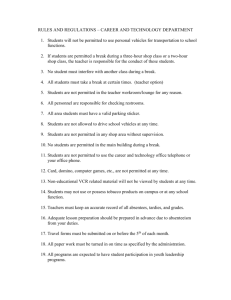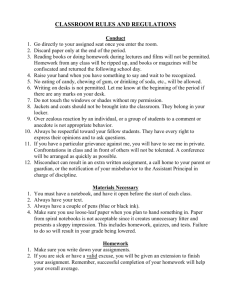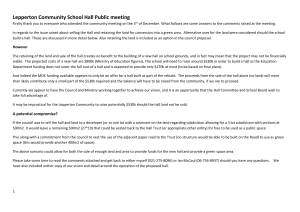Use Classes Order
advertisement
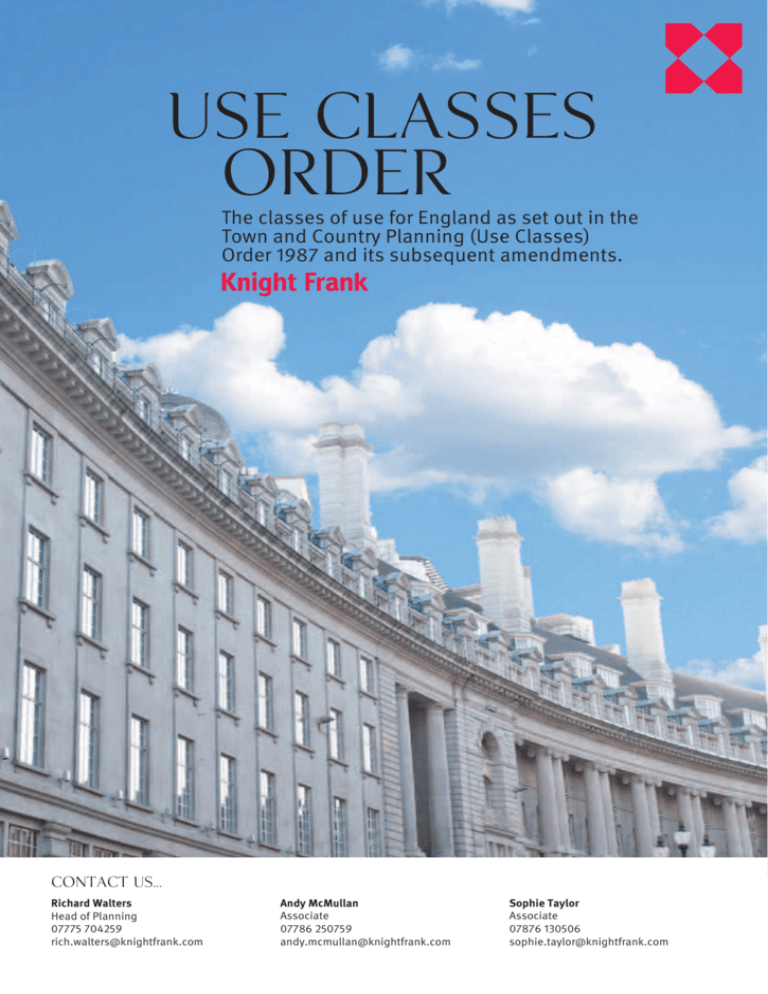
Use Classes Order The classes of use for England as set out in the Town and Country Planning (Use Classes) Order 1987 and its subsequent amendments. Contact us... Richard Walters Head of Planning 07775 704259 rich.walters@knightfrank.com Andy McMullan Associate 07786 250759 andy.mcmullan@knightfrank.com Sophie Taylor Associate 07876 130506 sophie.taylor@knightfrank.com TCPA (Use Classes) Order 1987 (As Amended) Use / Description of development Permitted change A1Shops Retail sale of goods to the public - Shops, post offices, travel agencies and ticket agencies, hairdressers, funeral directors and undertakers, domestic hire shops, dry cleaners, sandwich bars (sandwiches or other cold food purchased and consumed off the premises), internet cafés. No permitted change A2Financial and Professional Services Financial services - Banks, building societies and bureaux de change. Professional services (other than health or medical services) - Estate agents and employment agencies. Other services - Betting shops (principally where services are provided to visiting members of the public) A3Restaurants and Cafés Use for the sale of food for consumption on the premises. Excludes internet cafés. A1 or A2 A4Drinking Establishments Use as a public house, wine bar or other drinking establishment. A1, A2 or A3 A5Hot Food Takeaway Use for the sale of hot food for consumption off the premises. A1, A2 or A3 B1Business (a) Offices other than in a use within Class A2. (b) Research and Development - laboratories, studios. (c) Light industry. B2General Industrial General Industry (other than classified within Class B1). B8Storage or Distribution Wholesale warehouses, distribution centres and repositories. C1Hotel Hotels, boarding houses and guest houses. No permitted change C2Residential Institutions Hospitals, nursing homes, residential education and training centres. Use for the provision of residential accommodation and care to people in need of care. No permitted change C3Dwellinghouses (a) Covers use by a single person or a family (a couple whether married or not, a person related to one another with members of the family of one of the couple to be treated as members of the family of the other), an employer and certain domestic employees (such as an au pair, nanny, nurse, governess, servant, chauffeur, gardener, secretary and personal assistant), a carer and the person receiving the care and a foster parent and foster child. (b) Up to six people living together as a single household and receiving care e.g. supported housing schemes such as those for people with learning disabilities or mental health problems. (c) Allows for groups of people (up to six) living together as a single household. This allows for those groupings that do not fall within the C4 HMO definition, but which fell within the previous C3 use class, to be provided for i.e. a small religious community may fall into this section as could a homeowner who is living with a lodger. No permitted change C4Houses in multiple occupation Small shared dwelling houses occupied by between three and six unrelated individuals, as their only or main residence, who share basic amenities such as a kitchen or bathroom. D1Non-Residential Institutions Clinics and health centres, crèches, day nurseries, day centres and consulting rooms (not attached to the consultant’s or doctor’s house), museums, public libraries, art galleries, exhibition halls, non-residential education and training centres, places of worship, religious instruction and church halls. No permitted change D2Assembly and Leisure Cinemas, dance and concert halls, sports halls, swimming baths, skating rinks, gymnasiums, bingo halls, other indoor and outdoor sports and leisure uses (not involving motorised vehicles or firearms) No permitted change Retail warehouse clubs, amusement arcades, launderettes, petrol filling stations, taxi businesses, car/vehicle hire businesses and the selling and displaying of motor vehicles, nightclubs, theatres, hostels, builders yards, garden centres No permitted change Casinos - following declassification, planning permission is needed for any premise, including D2 premises, to undergo a material change of use to a casino. D2 (Last amended by the TCPA (Use Classes) (Amendment) (England) Order 2010) Sui generis * A1 (where there is a ground floor display window) B8 (where no more than 235m²) B1 or B8 (B8 limited to 235m²) B1 (where no more than 235m²) C3 (Where the change is not restricted by the LPA) * Whilst the most commonly found uses are contained within the 1987 Use Classes Order (as amended), there are many uses that are not specifically categorised by the four main use classes. These are classified as sui generis. We have tried to illustrate some of the sui generis uses but they are not intended to be exhaustive. Sui generis uses are their own specific use and planning permission is normally required for any change of use. This is a general guide only to the Use Classes at April 2010 and is not intended to be comprehensive or a substitute for taking detailed professional advice. No liability is accepted for the information it contains or for errors or omissions.
